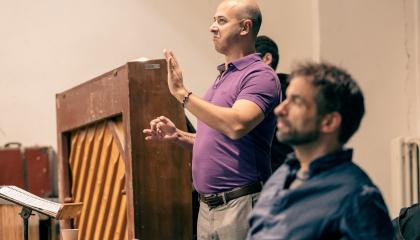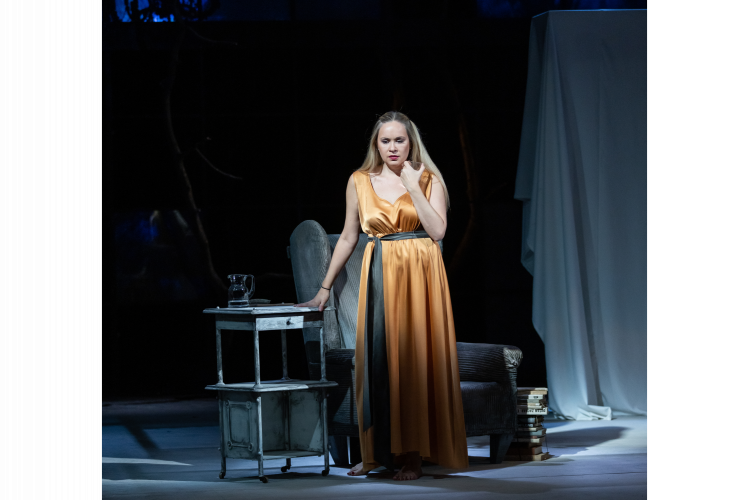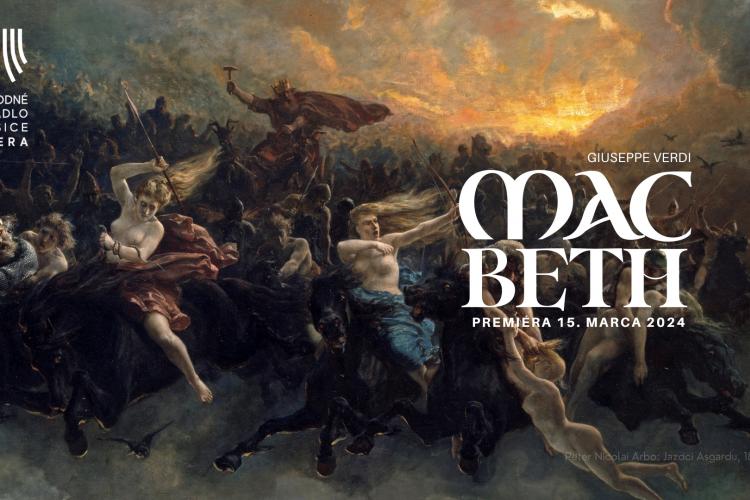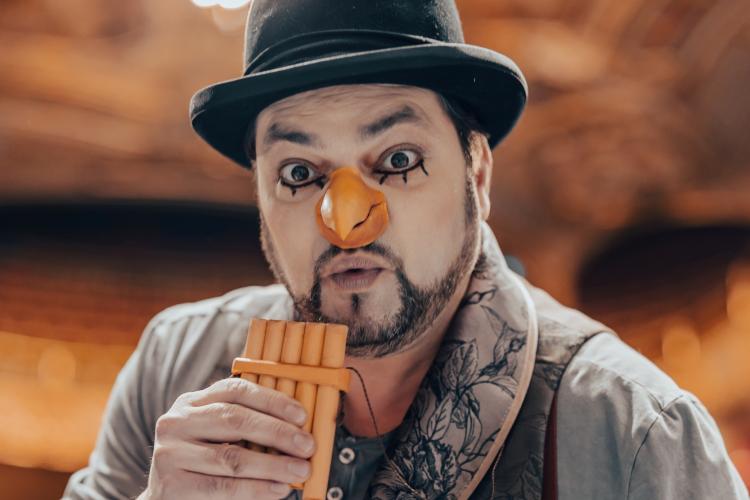A week later, on Friday - October 29th, the Opera Company ŠDKE presents, for the first itme, the opera WERTHER. by Jules Massenet. At the occasion of the opera, the dramaturge of the opera Stanislav Trnosvský spoke to the director Alexander Wiegold and chief-conductor Vinicius Kattah, about the work, rehearsal process, and especially Jules Massenet’s music.
Jules Massenet wrote the opera based on the novel by Johann Wolfgang von Goethe the Sorrows of Young Werther. The novel written in the form of letters was very famous in his time. We could almost say it was a 'Werther’s Revolution'. Jules Massenet composed his opera more than hundred years later.
Stanislav Trnovský (ST): Alexander, how important is Goethe’s original for you? Tension between Massenet and Goethe? Libretto is of course in French. To what extent it is French or German work?
Alexander Wiegold (AW): At first, it is necessary to remind that Massenet and his librettists closely followed Goethe’s original. It is remarkable because almost every sentence in libretto has its equivalent in Goethe’s novel. The two pieces are very close. I feel that they really made a lot of effort to reflect the essence of Goethe’s novel. They changed a few dramaturgic elements as the opera cannot be so subjective as the novel in letters. For example, we get to know Charlotte’s perspective, in contrast with the novel. And this is very different from the original. Another difference is, if we can reveal it, that Werther does not die lonely. The moment of his death is a great love scene. Is it typically French? I can’t say really. Considering that it is a French opera, to me it makes an impression of a quite German piece. The authors taken over a lot of Goethe’s work. Even background is very local, the place where the story is set. This local feeling is perhaps even stronger than in Goethe’s novel. The Gasthof and everything around, I think they tried to make an impression of German countryside.
ST: I just want to note that Massenet travelled to Germany, he wrote about it. He was in Bayreuth where he saw Parsifal. Then he went to Wetzlar, so he got better understanding of the area where the story is set. I think local German character affected him a lot. And he read a new French translation of the Sorrows of Young Werther which made a great impression on him, so he profoundly felt the work and composed the opera.
ST: Vinicius, how do you see it?
Vinicius Kattah (VK): I can only agree. I see it the same way. From the point of music, Massenet tried to include in the opera both elements, German and French. But here I beg to differ from Alexander a bit. In German pieces, love is not that strongly presented, as it is in French pieces, especially when we speak about Paris, we think of love. Therefore, at the end, as Alexander said previously, we see this great love scene of Charlotte and Werther. This love scene is very French-like, it is beautiful. Massenet’s works are as if painted. One has the feeling he paints his scenes. That’s brilliant in my opinion. Goethe’s novel, piece full of tension, sometimes deeply depressive, sometimes deeply happy. We can see Goethe’s Werther, but there’s more to it. I think that Massenet tried to show it in his music. It is, similar, to when Alexander and I speak about Werther. Each of us has a bit different approach. Massenet managed to include in his music also such different approaches. It is incredible.
ST: Isn’t it surprising that great German composers of the 19th century did not dare to approach the masterpieces of German literature? Faust was put into music by Charles Gounod and then Arrigo Boito. Also, Schiller’s Don Carlos was composed by Verdi. Mostly French composers dared to do that. Just as with Shakespeare’s Romeo and Juliet or Hamlet by Ambroise Thomas. Did German composers think that the topic is so serious in German history that it can’t be transformed into music? Vinicius, what do you think? I mean from music point of view.
VK: That’s a great question. One must be, really, strong and have no fear to be able to compose Werther, being a French composer. And even in French. The premiere was in Vienna, though it is a different topic. If we realize that all, even me – but not as a kid, because German is not my first language, including kids read Goethe in German. The first time I read Werther was in German. Had I read it the first time in Portuguese, Italian or French, it would be very different. And this idea that the French were courageous enough – it is ingenious. It adds colour to it.
ST: In Germany, Gounod’s Faust wasn’t presented for long as Faust. It was called Margaret. Germans perhaps thought that it is not the great story Faust, it is just a love story. As you said, French like to speak about love.
Massenet’s opera is sometimes criticised that it tends to be sweet, sentimental, almost at kitsch level. Do you think the same? Do you or director need to prevent this tendency? At all?
AW: I wouldn’t use words such as sentimental or kitsch with this opera. It is the question of its adaptation. Something is a kitsch if we feel that it is superficial, empty, having no depth, and Massenet’s music is deeply profound. There’s nothing sweet about it. I think that would be a very superficial listing to Massenet’s music. To be honest, I saw it that way. I saw Werther only once. Unless you go deep into the opera, as it is slightly overcomposed, you may miss it. With superficial listening, you may have the impression of sweety music, in fact, however, it is music full of emotions. Most scenes describe sorrow rather than happiness in love. That’s why I wouldn’t describe the opera as sweet. This music is of course extremely emotional. This may overwhelm you, at the first time, as it is incredibly comprehensive.
ST: After Goethe wrote his novel, Werther’s wave was in. People started to dress like young Werther, it was also followed by the wave of suicides, he himself says and/or such cases have happened in Goethe’s circles. Goethe then rewrote his work. But the blame remains upon Goethe that he, in his novel, drew people to suicide. The opera and the novel, are they about suicide? Is this the topic?
AW: The topic – suicide is eminently refined into detail. We see deep reflexion of suicide. It is unusual, though in operas we often see people end their lives for love. But suicide has rarely such a detailed introduction. There’s whole aria where Werther reflects the idea of suicide in a very unusual way. The work as such, of course, isn’t solely about suicide. It is about love and suicide is rather an attitude to love. Here, I wouldn’t see the suicide somehow realistic, the issue is rather that when love absorbs us or, conversely, we practically get lost in someone else, it is a kind of suicide. And should such love be unrequited, and pain be so enormous one cannot bear, then it means that such love, as an idea, is so large that it is larger than my own life. In literature and opera, suicide is way how characters deal with something, which is larger than ourselves alone. Something that completely embraces us, and we’re unable to cope with.
ST: How can we see Werther? He is sometimes depicted as a weak, today we could say a looser unable to find his way into real world. Is he a weak or rather a free-spirited man, rebel standing against society, ending up tragically? Who is Werther, in your opinion?
AW: If we say that Werther doesn’t live in real world, we must ask, at the same time, what real world exactly means. Reality doesn’t include just objects (such as chair), ideas and concepts are similarly part of reality. The idea of romantic love isn’t something pulpable we could touch, but it exists and somehow influences all of us in our life, thinking, and feeling. Werther lives in this world of ideas and concepts. That is why I wouldn’t say we live in real world, while he is somewhere else. He lives in extended reality. He sees what lies behind. He wants to see more deeply. He is looking for deeper meaning of things, great ideas he could take over, place where he belongs. On one side, he behaves quite passive, because he isn’t that rebel taking up his sword to direct people the right way, he is passive in this sense. He goes his way. When speaking about consistency, he is very strong. Werther was particularly praised for this by his contemporaries. He stated unconditionally that what he feels is ultimate truth. This is the only thing that matters. Thanks to such consistency, Werther becomes almost a heroic character. Until the end he says, he can’t reach that love and he will sacrifice his life to it. His acts don’t make him a typical hero, but he is very strong in his attitudes.
VK: I would agree with this opinion, also from music point of view. I understand people who say that Werther could be seen as a looser from present-day perspective. But from the point of music, it is entirely the other way. I agree with Alexander. We cannot say he is a hero. I love the words Werther says at the very beginning of the opera. "I don’t know it’s a dream or I’m really here." At this exact moment we get to the issue of reality. But I would go even further. We talked about this a bit with Alexander in our first discussion. Werther is in a way rebel, when we look at him from religious point of view. Charlotte prays all the time, she talks to God (Seigneur, Dieu, Seigneur), but she can’t have relationship with Werther, as she promised that to her mother. This is a very strong element in religion. On the contrary, Werther is not bound by that. That is why Werther speaks a lot about nature. They both don’t understand each other in this, and so Werther either doesn’t fully understand Charlotte. The suicide at the end is a very strong moment, this interaction between them is extremely complicated. When Werther sings at the beginning, we can hear something very beautiful, lyric. In Act II he sings almost as a heroic tenor. This aria is very demanding, we hear music jumping and fast tempo, but it ends with quite a depressive aria. It means that Werther gets lost in himself. The end of the opera always gives me the shivers. After Werther’s suicide - the moment the kids are singing (Jésus vient de nâitre). It is incredible. There’s death on one hand, and birth on the other. Jesus is born on 25 December and Werther’s life on Earth ends up. This is very brutal, extremely difficult and that’s why I would say that there’s very little kitsch in the opera. If you do the music well, singers sing well, it may become a bit of kitsch. Moreover, we speak about harmony here. Massenet is no Debussy or Ravel. It will take another twenty years to change harmony a little bit. Massenet is very clear, very structured and music is fully harmonic. Sometimes we call it a kitsch.
ST: I’m of the same opinion. When someone decides to commit suicide, it is rebellion against God and religion. And those kids singing at the end, that’s Massenet’s contribution. At the beginning, kids sing a Christmas song in summer, they are rehearsing, and then they sing it at the end. Very strong moment.
Let’s go to the second leading character - Charlotte. Is she the secret main character of the opera? She seems to be more important in the opera, compared to Goethe’s novel. She is by far more dominant here. We see her deeply rooted in the society she lives in, but at the same time her character and behaviour are more dominant towards Werther. Is it so?
AW: Purely from dramaturgical point of view, we can say she holds the whole opera together. Everything depends on her word, her decision. Had she said to Werther she loves him and leaves Albert at the beginning, the opera would have ended in the first act. She keeps tension, as she keeps her decision open. This could be interpreted in many ways. In view of that time, we could say she couldn’t act differently. She had to keep bourgeoise standards of behaviour. Our interpretation however is a bit different. Charlotte is between two concepts of love, between two men. Werther, as a loving man, is even dangerous because such passion can ruin a person. There are people who do not want a quick love affair, they want a stable relationship. It means that love can be seen very differently, one can have different expectations. From this point of view, Charlotte is even more important, she is in the centre of the conflict where the essence of the conflict is that a man appears who is fascinating and with his view and poetry appeals her deeply. Someone who admires her. On the other hand, Charlotte has husband who is loving, incredibly caring, and able to give her more-less stable life. This is very different from what Goethe wrote in his novel where Charlotte is a mere object. Only Werther’s point of view reveals what she’s going through. The opera is totally different. Her character is nicely built-up, as she is rather a secret character in the first act, one can only presume what she feels. It remains open how much she loves Albert, whether she loves him at all. We see sudden turnabout in the third act, of course due to shift in time. And now we are so close to her, we see her perspectives. Yes, from this point of view, Charlotte is in the centre of the opera. Whether she is the main character, it is disputable but, for sure, she is the one around whom the whole story revolves.
ST: In terms of music, I think it’s the same.
VK: Yes, absolutely. In terms of music, I really need to say - and I used to say that while rehearsing - that it’s a dream of each tenor to have such an aria from the very beginning. Right from the start of this beautiful aria, the moment Werther steps in, it is simply brilliant. Charlotte steps in very modestly. We love Charlotte from the beginning. She comes with kids, with Sophie, and she goes through that great transformation in the third act. This is the moment we say, o.k. this is an interesting person. Of course, it happens already earlier, but it really turns in the third act. I think Massenet was quite cleaver to give Charlotte this perspective, so we can see Charlotte’s scene with letters. Otherwise, it would be just Werther’s intuitive projection – Charlotte reading his letter. I feel that at the beginning one can have a bit aversion to Charlotte, the first duet of Charlotte and Werther with its beautiful music, scene in the garden, we hear harp the first time, cello solo, this octave which sounds like Puccini. After twenty beats, Charlotte sings – I must go. In terms of music, viewer says: please no. Werther starts to sing, just like any man – he does not want to admit it, he sings - look, your eyes, your beautiful eyes. Repeats it, three times. And we say to ourselves: Charlotte let this beautiful music continue. And when we think it’s the end, then “Charlotte, Charlotte!” Albert is back. I think many viewers feel at that moment: “Charlotte, why did you do it?” Then, one feels little affection for Charlotte, feelings are for Werther. So, to me Werther is the main character. Here, he is almost a hero. But later, positions change. Charlotte’s role becomes strong at the beginning of the third act; even music is strong now, so masterly.
AW: It is interesting. With the use of artistic means, we can see how Charlotte’s perspective changes here. Love works, and pain of love grows, especially, due to distance and in the imagination. When a beloved one isn’t present, brain starts working, and if it is emphasized by letters what we see in Charlotte’s scene, her head is spinning around. It is a nice study. At first, it is Werther who sees all those things in Charlotte, he’s got a lot of fantasies. His fist scene is like that. We see family and we see home, but when he steps in, he sees paradise. A lot is going on in their minds, and I find it important for our opera adaptation as it is the essence of love. Imaginations just come with love and sometimes totally overwhelm us.
ST: Let’s get to other characters: Albert and Sophie. Sometimes there’s a risk that the two characters show only principles; and it is a cliché. E. g. younger sister Sophie; here it should be reminded that all the characters are very young. I think that Sophie is only fifteen. Others are very young as well. And father, the old man, he is only fifty. Today, we would say he is still young. Back to Albert and Sophie. Is Albert only a husband, the good guy who let it all happen? Or he makes his own decisions and has his own ideas?
AW: For sure, I see Albert as a more comprehensive personality then he is usually depicted. Actually I’d like to see him as an equal rival. Albert lacks some qualities, Werther has. His unique world view, sense of poetry, and all his personal background. He is a man with his feet on the ground, not a bad quality. He has a lot of good qualities; really takes care of Charlotte. He has sincere interest in her wellbeing. It is interesting, but this character transforms as well. He, gradually, understands what’s going on with Werther, and he tries to, in almost modern way, handle the situation. We see no confrontations of two rivals, threatening a duel and so. Quite the opposite, Albert tries to deal with the situation and seeks friendly dialogue. However, later Albert becomes desperate as well, he becomes almost brutal. Of course, he is lesser character, but to me he is more comprehensive character.
ST: And Sophie, Charlotte’s younger sister? In terms of plotline and music, does she have anything in common with Charlotte? What do you think?
VK: I would start with musical point of view. We spoke about it, that everything brutally changes. We spoke to both the interprets doing Albert. We spoke about Albert and Charlotte’s duet in Act II. Had Albert sung with true love, colour and tone of music would have been totally different. Had there been no love in his singing, we could see and hear something bureaucratic such as I’m looking forward to my next travel. Music would be totally different. The same we see with Sophie. Massenet needed someone, that’s why we have here Sophie, Johann, and Schmidt. I think opera needs lightness. It needs to be in a way lightweight and amicable. Sophie always comes with nice dancing music. She dances and enjoys it. And I like it. I think Charlotte is like that as well. At certain point, Charlotte then losses this. Sophie is this type of character, she has around four beats when she is sad a bit, but then she comes back to herself, and she says let’s go further. We’ll handle it. It is good in my opinion. She is a soubrette; this character should be like that. A bit of laughing, a bit of dancing, this is how I see Sophie’s character.
AW: I think that contrasts are important in this opera. There’s a perfect contrast to that ultimate melancholic Werther drowning in darkness. Sophie and her perfect innocence represent this contrast. She is truly like that. I would never think she is only pretending that, just for good mood. In a way, this makes her an impressive character; with her attitude she faces absolute contrast. When she meets Werther, who is totally devastated and broken. Just imagine you feel totally broken and someone like her suddenly comes in, you become upset. These scenes are great for the fact that Sophie is the way she is. And she brings that incredible joy of life. This of course clashes with Werther, and it is again almost tragic. It is well done, here we have somebody who is, absolutely, innocent, not yet burdened by the bad things in life.
ST: We spoke about music. Vinicius, you mentioned that Jules Massenet is somewhere between Gounod and Ambroise Thomas on one hand, and Debussy and Ravel, on the other hand. Is he an intermediate step? We can hear a bit of impressionism, which comes soon? E. g. descriptions of nature, etc.? This is my first question. The second question is: this is the period after Wagner’s death, and, of course, music until 20th century was influenced by Wagner. Either in positive or negative way. And then, there were Wagner’s epigones or those who were inspired by him, and even his opponents. Anyway, they all were strongly influenced by him. Applies the same to Massenet?
VK: Yes, absolutely. I think that Massenet once gave interview where he spoke a bit about his life. And they asked him what music he likes to listen. At the very beginning he mentioned Wagner’s Tannhäuser, Der fliegende Holländer, he loved all Wagner’s operas. That’s why he wanted to go to Bayreuth, we can even here some leitmotifs in his music. The leitmotif is very clear. These leitmotifs are not fully like Wagner’s leitmotifs. They are a bit different but, yet they can be heard. For example: when Albert enters. This topic is going nowhere. It is blockade. And Albert is like this. We don’t know whether Albert will or will not stay with Charlotte. That’s why the music is so. And Werther’s music. Beautiful D-dur right from the beginning. I think Massenet took good stuff from Wagner; that what he wanted, what he found good. He used them, but in a different form. Really in a different way. For example: right from the beginning we can hear prelude, which is repeated at the end, but in a slightly different key. Or cellos where we always hear solos. Or the way Werther repeats 'Charlotte' at the end. These things were well used by Massenet. How Massenet’s music sounds? I think, he strongly influenced music as well. He wanted to experiment a lot, but appropriately to his time. Later, Debussy and Ravel had by far more freedom. But we speak about someone who was born twenty-thirty years sooner, in 40s of the 19th Century. At that time, everything was still very clear in French music, not in German music.
ST: We managed to put together a very good cast – internationally renowned guests up to local singers. We have singers from the Czech Republic, we have singer who have just graduated from school. We could say something about the cast, Vinicius.
VK: My pleasure. We’re very happy for this colourful blend of nationalities. To me, it is very inspiring that the two of us, we are from Vienna. I come from Brazil, but I’ve lived for more than 12 years in Vienna, where the opera was actually first time presented. It will be amazing to me if we manage to be international. As for Werther, it is great advantage and we’re very happy to have Peter Berger and Michal Lehotský. We’re very happy for Charlotte as well, we have this world renown singer Elena Maximova, and local singers Miroslava Havryliuk or Viera Kállayová. All three of them represent a totally different Charlotte. Alexander is great, thanks to his concept, things are not always the same. The same applies to music. And, of course, we have Jirko Rajniš and Marián Lukáč as Albert. We’re very happy for them. We have such a good cast that I’d rather sit in the auditorium.
ST: Just to remind, Elena Maximova sang Charlotte with great success in Vienna State Opera. Peter Berger and Jiří Rajniš did these roles during the last premiere three years ago in the National Theatre Prague; legendary production by Willi Decker. Maybe we could mention that Werther’s world premiere was not held in Paris, it was in Vienna in German language. Translation was done by Max Kalbeck. Parisian opera Opéra Comique considered the work to be too gloomy. Then the work was premiered in several other opera houses, and one year later the opera was premiered in Paris.
The State Theatre has never presented Werther, which is remarkable. The opera has presented other Massenet’s pieces, other than Werther. In your opinion, what the opera means for present day audience? Can it give something? Is opera up to date today, more up to date than ever? Or is it timeless?
AW: I would rather say it brings incredible timelessness. Many people are overwhelmed by love and passion; it is timeless. The work deals with fundamental conflicts which are universal and human. For example: the fact that we have urgent need to cross borders and seek something new. Exactly what Werther wants, and what happens with each new love and passion, which is always insecure and dangerous, as one never knows whether he/she falls, and where he/she eventually falls. And simultaneously, all of us we have the need to live in stable patterns, have structure in one’s own home. All the figures, including Werther, find themselves amid of such conflict. Werther himself makes impression of a man with no home, one who does not belong anywhere. That is why I would say that opera Werther is not an up-to-date topic, topic from today’s paper. Instead, it portrays something universal about us people, and about love. It is always thrilling.
ST: I would like to thank you, both of you, for the interview. We are looking forward to the premiere on October 29.
Interview with director Alexander Wiegold and conductor Vinicius Kattah was done by dramaturge Stanislav Trnovský.






